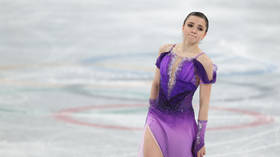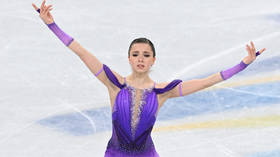New claims arise about Valieva case

The sample returned by Russian figure skater Kamila Valieva in December included three different substances which can be used for heart treatment, according to a report claiming to have seen documents in her doping case.
The New York Times alleges that in addition to the banned heart medication trimetazidine, the Stockholm laboratory which analyzed the sample from Valieva also detected two other heart medications that are not on the banned list.
The substances – Hypoxen and L-carnitine – were supposedly listed on a doping control form by the skater.
Valieva’s team have suggested that the presence of the banned drug trimetazidine may have come from contamination via medicine being taken by her grandfather.
According to the NYT’s unconfirmed report, based on Valieva’s emergency hearing with the Court of Arbitration for Sport (CAS) which cleared her to compete in Beijing, the skater’s grandfather featured in a video shown to the panel where he confirmed he took the medication periodically.
Valieva’s mother is said to have told Russian anti-doping investigators that the skater’s grandfather regularly accompanied the teenager to practice and stayed with her until the parent had returned home from work.
Valieva’s mother is also said to have informed the investigation that her daughter had taken Hypoxen, which is not banned, due to “heart variations”, the NYT claimed.
The report comes despite CAS not yet releasing the full details of the hearing which it held on Sunday night, and which ran into the early hours of Monday morning.
The 15-year-old star was cleared to compete by a CAS panel on Monday, having already helped the Russian Olympic Committee (ROC) to gold in the team event in Beijing before her positive test result was reported from a sample taken on December 25.
Valieva took to the ice on Tuesday for the ladies’ individual event, which she leads after the short program stage. The competition concludes with the free routine on Thursday.
The International Olympic Committee (IOC) – which had been seeking to reimpose a provisional suspension on Valieva – has already said no medal ceremonies will be held for the team or women’s events in Beijing, in light of the ongoing investigations into Valieva’s case.
Valieva’s team, as well as Russian Olympic and figure skating officials, have maintained their belief that the skater is innocent of any wrongdoing. They noted that Valieva repeatedly passed doping tests before and after her positive sample was reported.
Questions have also been raised as to why the positive result from the laboratory accredited by the World Anti-Doping Agency (WADA) took so long to be reported.
Valieva did not speak to the press after short program performance on Tuesday in Beijing, where she was some way off her world-record best score but still leads the competition ahead of countrywoman Anna Shcherbakova and Japan’s Kaori Sakamoto.













